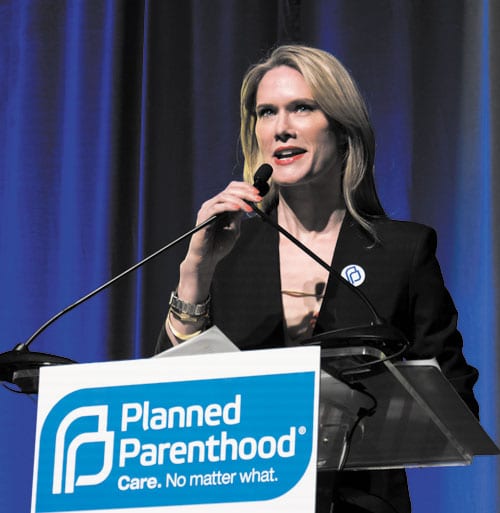In the face of criticism, Planned Parenthood is expanding services, including services for trans people
JAMES RUSSELL | Staff Writer
Last year, a day after Thanksgiving, Robert Dear Jr., a self-described “warrior for babies,” killed three people and injured nine others at a Planned Parenthood clinic in Colorado Springs. Around that same time, Republicans in Congress threatened but ultimately failed to shut down the government if the reproductive health organization was not defunded.
Last December, Texas cut HIV prevention funding for Planned Parenthood Gulf Coast.
But you wouldn’t know the organization was suffering, judging by the crowd at Planned Parenthood of Greater Texas’ annual Dallas luncheon Monday, April 4 at the Hyatt Regency Hotel. The luncheon attracted 1,400 people and raised more than $870,000 for the organization, which services the Central and North Texas regions, including Austin, Dallas, Fort Worth, Paris, Tyler, Waco and surrounding communities.
Featured speaker was Cecile Richards, president of Planned Parenthood Federation of America and Planned Parenthood Action Fund. A Dallas native and daughter of the late, revered Texas Gov. Ann Richards, she joined the organization in 2006.
In an interview before the luncheon, Cecile Richards was frank about her organization’s opponents, who have targeted it because some of its clinics provide abortions.
“What we have seen over and over again is that when anyone — an organization or politician — puts politics ahead of folks’ healthcare, the outcome is disastrous,” Richards said. Her home state was not immune from criticism either.
The assaults on the organization after the state decided to not renew Planned Parenthood Gulf Coast’s federally-funded contract did not stop; there’s always more to scapegoat if it means an elected official can fundraise off it.
In February, Rick Allgeyer, Texas Health and Human Services Commission’s director of research, stepped down after facing criticism from state leaders because of his involvement in a study that found a 35 percent decline among women accessing the state’s women’s health program after Planned Parenthood was kicked out in 2013.
Researchers from the Texas Policy Evaluation Project at the University of Texas and other agency employees conducted the study, and the report was published in the New England Journal of Medicine.
Agency officials said Allgeyer violated agency policy by contributing to an outside study. But that does not mean the report’s conclusions weren’t accurate, Richards said.
“It’s incredible to me you could have important piece of research that is factually based [and] the state doesn’t own up to the impact of [cutting our services]. The impact was immediate and was felt most acutely on populations with least access to affordable healthcare,” Richards said.
And it wasn’t just women that were impacted by the cuts, she added.
Locally, 11 percent of all Planned Parenthood patients are young men, Richards noted. And LGBT people use clinics too.
“I think it’s important to know we are a LGBT-welcoming healthcare provider and extremely proud of not only being a healthcare provider but a community leader. We welcome LGBT patients who are looking for services they can’t find elsewhere in the community or may not find without the sort of shame and stigma they feel when looking for reproductive healthcare,” Richards said.
Ken Lambrecht, CEO of Planned Parenthood of Greater Texas, knows first-hand that Planned Parenthood is a welcoming place.
“As a gay man, [I know] the cornerstone of Planned Parenthood is that we are a nonjudgmental organization that provides comprehensive reproductive healthcare to women, men and teens,” Lambrecht said. “We try to keep people healthy and teach individuals to live responsible lives. Everything we do is fight for equality for all individuals.
“You recognize decisions you make are supportive of where you want to be in life,” he added. “Our priority is you and to empower individuals to make personal choices. And we help them do so without judgment.”
According to the Centers for Disease Control and Prevention, the HIV infection rate among transgender people is about four times as in the national population. Transgender people of color are at especially high risk for contracting HIV. The reasons vary: fear, stigma or lack of affordable health insurance.
According to the National Center for Transgender Equality, one in three transgender people, and 48 percent of transgender men, have either delayed or avoided preventive health care out of fear of discrimination or respect.
Autumn Keiser, senior marketing and communications specialist for Planned Parenthood of Greater Texas, said the organization keeps an eye on trends and disparities in all communities, including the LGBT community. Clinic staff and volunteers, for instance, are trained to listen to and work with people so they are not afraid to talk about their sexual activity with doctors.
“Planned Parenthood believes that reproductive rights are deeply connected to LGBTQ rights,” Keiser said. “Our healthcare and education services are built knowing that, in addition to health impact of systemic harassment and discrimination, the LGBTQ community faces low rates of health insurance coverage, high rates of HIV/AIDS and cancer, and frequent discrimination from medical providers.
LGBTQ people of color are at an even higher risk for these disparities.”
She continued, “All incoming staff at Planned Parenthood of Greater Texas, including health center employees and administrative staff, receive training on [gender and sexuality], so that our patients and health center guests are served in an environment of inclusivity and care,” Keiser said.
When curricula are not inclusive of LGBT people, Planned Parenthood adapts the language to make it more inclusive and relevant.
“We often add a lesson using The Gender Unicorn graphic available online from Trans Student Educational Resources,” Keiser said.
Their marketing also removes barriers that make services seem inaccessible to transgender people, Keiser said.
“Simple changes in health messages — such as stating that ‘All people who have a uterus and cervix need to get screened regularly for cervical cancer,’ rather than saying ‘Women need to get screened regularly for cervical cancer’ — can make a difference in how welcoming and relevant trans people perceive these messages,” she said.
Nationwide, Planned Parenthood clinics have focused on other efforts to reach the LGBT community.
An estimated 32 and counting clinics nationwide now offer hormone replacement therapy and other preventive services, although none in Texas do so currently.
Recently, Planned Parenthood Federation of America launched Spot On, a period and birth control tracking application designed for any person who gets a period regardless of gender or sexual orientation.
In Texas, services are expanding once again after a few years of consolidation and cuts.
“Now the state has nothing to throw at us,” Lambrecht said, “we’re expanding and focused this year on ensuring access. We recognize we have a governor, lieutenant governor and Republican legislature hostile to choice, so we have to innovate.”
While Richards knows the damning criticism will continue, she is optimistic the tides are changing.
“There is a reckoning day coming,” Richards said. “The rhetoric against us and LGBT people is not going in favor of those folks.”
This article appeared in the Dallas Voice print edition April 8, 2016.















